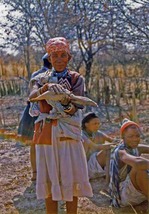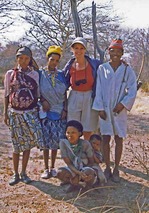|
A long time ago, the band of San people pictured here, allowed me a glimpse into their way of life.
An arduous journey had taken me far beyond the tarred road's end into the Namibian part of the Kalahari desert. There I found a small band of click-language speakers, Ju|'hoansi, specifically, who were trying to live off veld food: roots, berries, leaves and the odd game bird. They hadn’t seen ‘big meat animals' in decades; game fences had long ago put paid to the migration of the vast herds of antelope that used to traverse the Ju|’hoan’s traditional hunting grounds. I was there not as an anthropologist, but simply as a rookie novelist. I wanted to tell a story about a San girl but with some ethnological accuracy. I’d read everything I could find in those pre-internet, pre-university library access days. Anyway, as a writer I needed to know exactly what colour the Kalahari sand my character would squat in, was. And what the skin of the baobab fruit felt like. (Short pile velvet.) Slowly, shyly, the band and I became acquainted and eventually I was able to go out gathering and tracking with them and was invited to sit around their campfire listening to a traditional story. It was a seminal moment and when I left the people said: ‘Don't throw us away’. More than ten years later, I still hadn’t managed to find a publisher for the novel the trip had sparked. But in 2006 Salt & Honey was picked up and published by a then fledgling imprint called Legend Press. Naïvely I imagined that it would sell millions or the film rights would be optioned by Angelina Jolie, mad for things Namibian having just given birth there to her first child. I saw myself gifting the San who’d been so generous with me. It was not to be. In the end, thanks mostly to the sale of foreign rights, I was lucky to get back the money I’d borrowed from family savings in order to finance my research trip. Proud as I am of the sequel, Kalahari Passage (Tindal Street press, 2011) I’m not convinced it’s going to make anyone’s fortune either. Which is fine. I didn’t write about Koba to make money or a name for myself, but because I felt a wider world than that of San scholars should know about the injustices suffered by these gentle indigenous groups. But this leaves me with a debt still unpaid to the people of the Kalahari. It’s for this reason that I’d now like to explore the feasibility of using digital technology to allow the San to capture and collate story-telling material, use it to create an app, market it and profit from any sales. My project is tentatively titled ‘From Kalahari campfire to cyberspace: turning an oral folktale into an enhanced e-book.’ More utilitarian than catchy, so feel free to make suggestions. I am indebted to colleagues at the University of Wolverhampton for their help with this, especially those in the Project Support Office and in the Centre for Transnational and Transcultural Research. My thanks in advance to my patient and knowledgeable external advisors, Dr Megan Biesele and Marlene Winberg. I fear they are going to shudder everytime they see an email from me land in their Inboxes. I have much to learn from them and from San I’m eager to include just as soon as I secure funding for this project. Wish me luck as try to get this seed to sprout. And if you have any information which might help the project along, please, please share it.
6 Comments
|
AuthorAfrican novelist and out-to-grass, academic. Archives
January 2024
Categories
All
|


 RSS Feed
RSS Feed